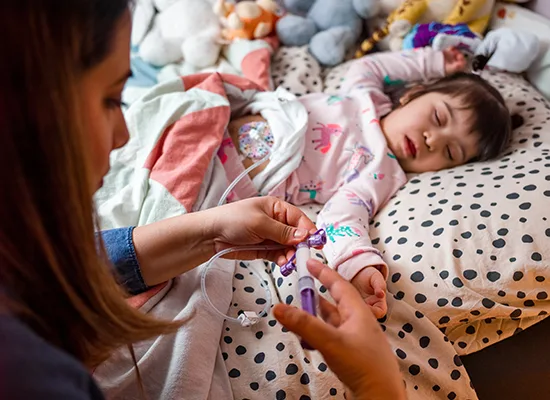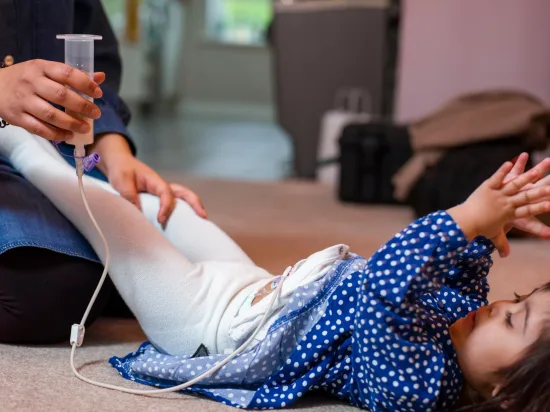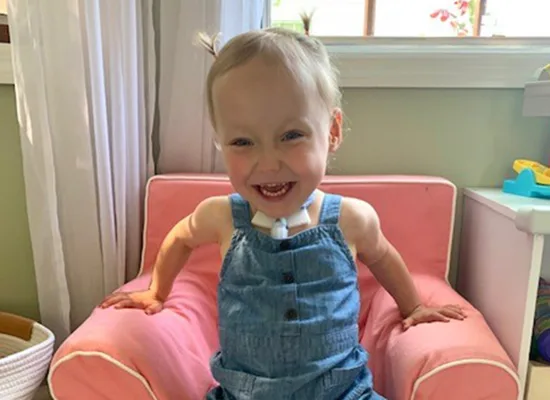Research Study Seeks Families to Help Improve Home Health Care for Children

“SafeCare@Home4Kids” aims to understand and prevent safety issues at home for children with medical complexity
A research study is looking for families to help improve home health care for children with complex medical needs.
The study is called “The SafeCare@Home4Kids Learning Lab: Designing Safer Healthcare at Home for Children.” It wants to learn from parents of children with medical complexity about what it is like to care for your children at home, including giving your children complex medication and using your children’s devices. The study aims to find ways to help prevent safety problems with this complex caregiving at home.
Dr. Carolyn Foster of Ann and Robert H. Lurie Children’s Hospital of Chicago is leading the research team. Foster is also a member of the Division of Specialized Care for Children’s (DSCC) Medical Advisory Board.
By sharing your experiences, you can help “SafeCare@Home4Kids” find ways to better support and help parents while reducing problems and challenges at home.
What does the study involve?
Participation in the study will take about one week. For seven days, you will send photos or text-based messages about your experience with your child’s medication-related activities and devices at home. Please note, if you do not have a device, the study researchers will loan you one.
After the week is over, you will meet with research team members to talk about your messages. You will also participate in a “critical decision methods” interview about how you:
- Identify problems with your child’s medication or device
- Communicate the problem
- How you have problem-solved these issues in the past
The research team will keep your answers confidential. If you complete all study steps, you can receive up to $195 by virtual gift card.
How do I participate?
You can enroll in the “SafeCare@Home4Kids” study if you:
- Speak English or Spanish
- Have a child who is 17 years old or younger with a disabling complex chronic condition who uses an implanted medical device to receive medication at home (such as a gastrostomy tube)
Please email fosterlab@luriechildrens.org or call (312) 227-2510 to enroll or ask questions.
For more details about the “SafeCare@Home4Kids” study and DSCC’s involvement, please visit https://dscc.uic.edu/dscc-partners-in-research-study-to-improve-home-health-care-for-children/.
You can also see the study flyer for more information.
DSCC Partners in Research Study to Improve Home Health Care for Children

“SafeCare@Home4Kids” aims to understand and prevent safety issues at home for children with medical complexity
The Division of Specialized Care for Children (DSCC) is excited to partner on a new research study to help improve home health care for children with complex medical needs.
The research team is led by Dr. Carolyn Foster of Ann and Robert H. Lurie Children’s Hospital of Chicago. Foster is one of our Medical Advisory Board Members.
Foster and her research team have received a $2 million grant award to fund the study, called “The SafeCare@Home4Kids Learning Lab: Designing Safer Healthcare at Home for Children.”
This study will bring together experts and patient families to better understand how family caregivers and home nurses can help identify, communicate and prevent safety issues at home for children with complex medical needs. The study will use this input to create a digital safety toolkit to help support families.
DSCC Executive Director Thomas F. Jerkovitz said DSCC appreciates this opportunity to partner in the study. He said DSCC will share our team’s experiences with families and home nurses who report safety challenges at home.
Dr. Molly Hofmann, our Director of Care Coordination, Systems Development and Education, is one of the participating experts.
“DSCC plays such a pivotal role in supporting care in the home and… is a repository for safety events,” Foster said. “DSCC also plays such a functional role in creating solutions, so it was pretty clear to me I wanted to have DSCC be a partner in the grant.”
Children with medical complexity need substantial amounts of care to live safely at home. In recent years, their families have taken on increasingly more in-depth medical care at home.
“We send patients home with increasingly more complex medical regimes, and families have expressed to us they didn’t have a clear way to get the support they need when experiencing problems at home,” Foster said.
“A lot of our patients have an artificial airway to help them breathe or they have a g-tube in their stomach to help them eat. If that gets clogged or it falls out or the tubing connected to the machine gets broken, then they can’t get the nutrition they need and they end up in the emergency room. And it’s a life-threatening event at home if their airway isn’t working,” Foster continued. “The idea for the study is we want to find out what are the things leading up to when those safety events occur so we can prevent them.”
“SafeCare@Home4Kids” also wants to help improve communication when medical device and equipment malfunctions happen at home.
“Doctors don’t always know, and families might not know that they should or can tell us about it. They might tell the DME (durable medical equipment company) to get the replacement part, but we don’t know about it, so we keep ordering it for other patients,” Foster said. “It’s both an issue for current patients and also an issue for future patients.”
The study aims to create a better system where families can communicate safety problems at home and know who to notify when they occur.
“One of the problems we recognize is families are scared they’re going to get in trouble. We want to make sure they feel supported to let us know when medical problems are happening at home,” Foster said. “The goal is to move past the reporting safety events to preventing them in the first place.”
The study will also host focus groups to hear directly from families about the safety issues that affect them.
“The goal is to hear from real families on what it’s like day-to-day,” Foster said. “Hopefully it’s the beginning of several projects to support how we’re improving care in the home.”
If you are a family member and would like to participate or learn more about the “SafeCAre@Home4Kids” study, you can email Foster at fosterlab@luriechildrens.org.
We are excited to collaborate with Foster and her research partners on this important project. We’ll share more updates and opportunities to get involved as it progresses.
The project kicked off in September and will continue through July 31, 2027.
New Training Resources on Caring for Children With Trachs

A new video and an updated free online course are available to help support the care of children with tracheostomy tubes
Parents and caregivers have a lot to learn when their child needs a tracheostomy (trach) tube to breathe.
Our Division of Specialized Care for Children (DSCC) team is here to support and guide families through learning how to care for their children’s complex medical needs.
We’ve gathered two new training resources to help families understand trach care.
Lurie Children’s Hospital Video on How to Handle Trach Emergencies
When emergency situations occur, it’s very important to keep the child’s trach tube open and in place.
Ann and Robert H. Lurie Children’s Hospital of Chicago has developed a video to help parents, caregivers and others know how to handle emergency situations with pediatric trach patients.
In this video, Lurie nurses explain:
- How to prevent and assess emergency situations
- How to manage a mucous plug
- How to replace a trach tube that has become dislodged
- What to do if the trach tube is difficult to replace
- When to provide manual ventilation using bag to trach tube, bag and mask to mouth, and mouth to mouth
We encourage our participant families in the Home Care Program to watch this video. Many of the children and youth in the Home Care Program rely on trachs and ventilators to breathe.
Please note that watching this video alone is not enough training to safely care for a child with a trach. Families should speak with their child’s doctors and care team about any questions or training needs.
For more information on how to safely care for a trach tube, you can visit Lurie’s Tracheostomy Care at Home webpage.
Free eHomeCare Course on How to Care for Children With A Trach
An updated free online course is available on how to care for children with trachs with or without a ventilator.
The eHomeCare program training is for:
- Nurses working in home-based environments
- Physicians
- Respiratory therapists
- Family members and caregivers of children with trachs with and without ventilators
- Students from health professions
The course is available until Sept. 30, 2026.
Learners can use this course for initial training, an annual review or as an ongoing resource.
The course learning objectives are:
- Describe best practices for providing day-to-day care for children with trachs with or without ventilators in the community
- Explain how to manage emergency situations for children with trachs with or without ventilators in the community
- Report an increase in confidence when caring for children with trachs with or without ventilators in the community
- Describe the roles and responsibilities of members of the healthcare team.
Free continuing education credits are available.
If you have trouble enrolling in the course or need help, please email help@icep.wisc.edu.
Again, please note that families should speak with their child’s doctors and care team about any questions or training needs for their child with a trach.
Our participant families can also contact their DSCC Care Coordinator with questions.
Leadership and Education Opportunity for Caregivers Living with Complex Medical Needs

National Consumer Scholars can develop leadership skills and share their experiences to help improve care and services for people with complex health and social needs
A leadership development program is available for caregivers and advocates who live with and/or care for someone with complex medical needs.
The Camden Coalition is accepting applications for its 2023-24 National Consumer Scholars program.
In the National Consumer Scholars program, caregivers and advocates can take part in peer-led leadership development activities. They play an active role in the coalition’s annual conference and bring lessons back to their local communities. Consumer Scholars also work alongside Camden Coalition staff to develop and inform the complex care field.
National Consumer Scholars have firsthand experience living with and/or caring for someone with complex health and social needs. They also have experience working as a consumer/patient advisor/advocate and/or community leader.
The program is open to individuals from across the country who represent many different experiences.
Learn more about the program and how to apply on the National Consumer Scholars program website.
The application deadline is May 31.
For more information, contact Evelyne Kane at ekane@camdenhealth.org.


